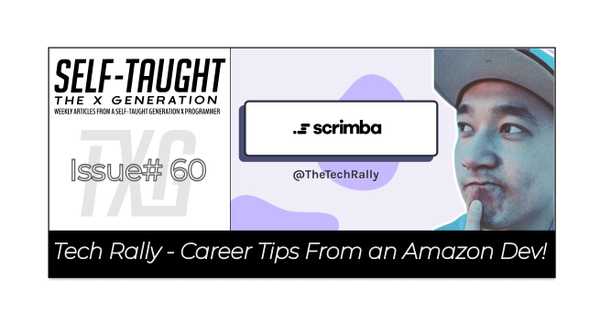Tech Rally: Career Tips From an Amazon Dev
Published on January 31, 2022
In this week's article, Alexander Lee (Tech Rally) joins us on a Scrimba Livestream to give us the tips we need to help us break into tech! Portfolio building, interview guidance, networking, and more!
About Alexander Lee (Tech Rally)
Alex graduated from the University of California, San Diego (UCSD) in 2011 with a Mechanical Engineering degree. He currently works a Amazon as a Front End Engineer.
Alex attended a three-month Bootcamp in Manhatten, and two months after completing it, he started a job as a full stack developer at an agency.
He realized he enjoyed front-end web development during his time at the agency and decided to make front-end his specialty.
Alex is a helpful member of the Tech Twitter community, where he regularly helps developers break their way into the tech industry!
Portfolio
For developers seeking a career in tech, Alex informs us that a portfolio website is essential.
Tufts University defines, "An online portfolio (may also be called a digital portfolio or e-portfolio) is an online representation of work you have created, as well as your skills and experiences. It could be a website, blog, or even a video channel. It could include your resume, a summary of qualifications and skills, images of class projects or design samples, audio and video, charts and schematics, process flows, and more."
However, Alex tells us that most developers experience "analysis paralysis" due to overcomplicating a portfolio by thinking they have to use a framework like React, learn to use backend systems, create functionality for a blog, and other such complications.
Alex tells us all we need for our portfolio is HTML, CSS, and a little JavaScript.
For a visual representation of what our portfolio website should be, Alex describes it as a museum, where our displayed projects are the main focus; the main focus is not the museum itself.
Design and Color Scheme
Design and color theory are beyond the scope of simply coding a website.
As a solution to creating a professional-looking portfolio website without learning design and color theory, Alex introduces us to HTML templates.
By utilizing HTML templates, we can customize them with our information to fit our needs and retain a professional look for our portfolio.
In addition to free HTML templates available online, Alex recommends themeforest.net as a good resource.
Note: Free HTML templates may include a "watermark."
Purchase your own domain
In addition to encouraging us to deploy all of our portfolio projects, Alex also encourages us to buy a custom domain name for our portfolio website.
Alex tells us we do not have to purchase a premium domain, such as a ".com" and you can buy one for as low as five dollars.
"If you're not willing to invest in yourself, then how can you expect a hiring manager or recruiter to invest in you."
-Tech Rally
To learn how to attract attention to your portfolio website, you can read my article "Create a portfolio website that gets noticed by tech recruiters."
Presentable GitHub
Initially, Alex did not believe having a presentable GitHub was essential. After conversing with his peers on Twitter, Alex has since changed his mind on the importance.
Alex tells us our GitHub will be scrutinized, and it is in our best interest to make sure it is pristine.
Our GitHub will be judged by:
- Activity
- Projects
- Quality of our code
In addition, to help our GitHub Profiles stand out from the crowd, Eddie Jaoude and Jesse Hall created excellent FREE resources to optimize our profiles.
I have taken both tutorials and have written and documented the process in these two articles. I highly recommend them!
- Review: Eddie Jaoude Course - How to customize your GitHub Profile
- How to Create a Next Level GitHub Profile, with Jesse Hall
Work Experience
As a developer trying to land your first job in tech, how can you apply for a job that requires work experience when you don't have work experience?
Alex provides us with viable options for supplemental work experience to satisfy this work experience requirement.
- Internships
- Freelancing
Internships
Alex presents an internship as a viable way to fulfill the work experience requirement.
However, Alex acknowledges an internship may not be suitable for everyone, especially an unpaid internship.
In any event, Alex says we may “have to do what we have to do” to get our foot in the door for our first tech job.
Freelancing
Alex tells us that freelancing also counts as work experience and that we should include any freelancing work we have done on our resume.
To get started as a freelancer, you can read my Freelancing 101 - with Sarah Shook article.
Here is an important note about stating you're a freelancer. In a previous LinkedIn review article I wrote, Danny Thompson explains that people unintentionally falsify their work experience by stating that they are freelancers.
Danny Thompson explains there is a distinct difference between being a freelancer and being a student.
When you state that you are a freelancer, hiring managers want to see receipts, meaning you were paid for your work.
Be sure to watch the full Livestream!
Certificates
Although Alex does not have any certificates, he tells us if you do not have a traditional form of education such as a college degree, certificates are really good to have as an alternative.
Again referencing my previous LinkedIn review article I wrote, Danny Thompson explains that certifications that are taken at test centers such as Amazon (AWS) & Google certifications will be acknowledged by hiring managers. However, online certifications earned from home are more for our own growth and personal achievements.
Transferable Skills
For those who are transitioning into tech without an educational degree in coding, Alex explains that our best approach is to present ourselves well by highlighting our projects and skills in our:
- Resume
- Portfolio
If we do not have a degree in coding, list all your skills above your education on your resume. If you have a degree in coding, list your education above your skills on your resume.
Building your online presence
During the Livestream, I asked if Alex had any tips for building our online presence, such as he did.
Timestamp: 52:00
For building our online presence, Alex recommends we focus on blogging and participating on Twitter.
Through his own experience, Alex says YouTube is slow in building an online presence as a developer.
Networking
Alex explains that Twitter Spaces are getting pretty big and that it is an organic way to meet other developers, and he tells us that Twitter Spaces is an excellent place to network.
Leanne, the Scrimba Livestream host, informed us that she got her job at Scrimba through Twitter!
Interviewing
While interviewing, Alex implores us to switch the narrative of "I can't" to "I can."
To illustrate, Alex tells us that if we are asked about a programming language we don't know, such as Python, we should mention a language we know, such as Ruby, and explain how our Ruby skills are transferable to Python.
Also, Alex advises us to ask for feedback after the interviews. Doing so will give us valuable insight into areas we need to approve.
Data Structure and Algorithms
While applying for a Front-End Web Developer position, you may or may not be tested on data structures and algorithms.
However, we are told by Alex while interviewing at FAANG company’s, such as Amazon, you will be tested on data structures and algorithms.
Danny Thompson, during the Livestream, recommended the following resources, "Colt Steele has a fantastic Udemy course on DSA, Cracking the coding interview is a tried & true resource, etc. There are many other resources out there, but I only have personal experience with these"
- JavaScript Algorithms and Data Structures Masterclass
- Cracking the Coding Interview: 189 Programming Questions and Solutions 6th Edition
frontendeval
If your looking for front-end developer questions to practice with, then be sure to check out frontendeval!
frontendeval is a platform created by Alex and Mike Chen to practice front-end exercises. All of the questions are FREE!
"Get ahead of the curve by training with exercises that mimic the questions asked by top Silicon Valley companies and startups."
-frontendeval
To learn about frontendeval's co-creator Mike Chen, you can read my article Mike Chen: Career Tips From a CTO
Tech Rally Courses
- Practical Portfolio: Build a Portfolio Easily with HTML, CSS, and Themes
- Build a Sports Odds Application with ReactJS, React Bootstrap, and Rapid API
- The Ultimate Developer Environment Setup
Tech Rally Links
Advance your career with a 20% discount on Scrimba Pro using this affiliate link!
Become a hireable developer with Scrimba Pro! Discover a world of coding knowledge with full access to all courses, hands-on projects, and a vibrant community. You can read my article to learn more about my exceptional experiences with Scrimba and how it helps many become confident, well-prepared web developers!
Important: This discount is for new accounts only. If a higher discount is currently available, it will be applied automatically.
How to Claim Your Discount:
- Click the link to explore the new Scrimba 2.0.
- Create a new account.
- Upgrade to Pro; the 20% discount will automatically apply.
Disclosure: This article contains affiliate links. I will earn a commission from any purchases made through these links at no extra cost to you. Your support helps me continue creating valuable content. Thank you!
Conclusion
A portfolio website is essential for web developers looking to land their first job in tech. A portfolio website does not have to be complex in its build, as the primary focus should be on the projects displayed.
While interviewing, we need to present ourselves in the best light possible. Direct the conversation on what you can do and what you have accomplished. Also, know that internships and freelancing are suitable substitutes to fulfill work experience requirements.
To network and build your online presence, Twitter is an excellent resource. Twitter is a platform where you can share your work, meet other developers, and participate in Twitter Spaces, resulting in "getting your name out there," ultimately giving you a competitive advantage when seeking employment opportunities!
Let's connect! I'm active on LinkedIn and Twitter.
Are you now encouraged to create a portfolio website? Has Alex's advice on interviewing and networking helped you? Please share the article and comment!
Please share it!









